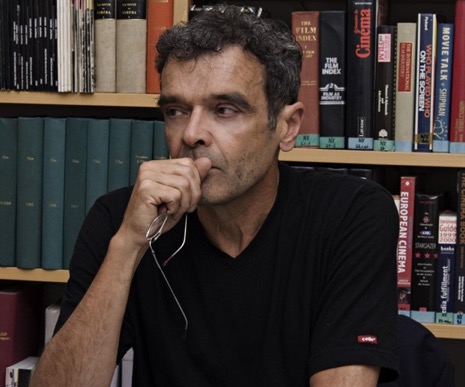

Biography
Harun Farocki is known for his films and installations that analyse the power of the image. His non-narrative works explore the ways image-making is used to shape the public sphere, emphasising images associated with modern institutions such as the workplace, shopping centre and factory. In addition to working as a filmmaker, Farocki was also an educator, critic, editor, theorist and curator.
Farocki directed more than 120 films, including In Comparison (2009); War at a Distance (2003); Arbeiter verlassen die Fabrik [Workers Leaving the Factory] (1995); Videograms of a Revolution (1992); Images of the World and the Inscription of War (1988) and Inextinguishable Fire (1969). He also created the installation Deep Play (2007).
His work has been the subject of solo exhibitions at Whitechapel Gallery, London (2016); CAPC musée d'art contemporain de Bordeaux, France (2015); Haus der Kulturen der Welt, Berlin (2015); Museum für Gegenwart, Hamburger Bahnhof, Berlin (2014); Greene Naftali Gallery, New York (2014); Museum Folkwang, Essen, Germany (2014); Museo Universitario Arte Contemporáneo, Centro de Cultura Digital, Mexico City (2014); Argos Center for Art and Media, Brussels, Belgium (2013); Galerie Barbara Weiss, Berlin (2012); Museum of Fine Arts, Houston, US (2012); MoMA, New York (2011); Center for Contemporary Arts, Glasgow (2011) and Tate Modern, London (2009). His work has also been shown in group exhibitions at Sharjah Biennial 13 (2017); MAXXI-National Museum of XXI Century Arts, Rome (2017); Moderna Museet, Stockholm (2016); 56th Venice Biennale (2015); Sharjah Biennial 10 (2011) and documenta 12, Kassel, Germany (2007), among others.
Farocki was a visiting professor at the University of California, Berkeley (1993-1999) and both visiting professor and a full professor at the Academy of Art, Vienna (2004, 2006-2011). He was also writer and editor at the magazine Filmkritik (1974-1984).
This person was part of Sharjah Biennials 10 and 13.
Related

Sharjah Biennial 13
Sharjah Biennial 13
Tamawuj
